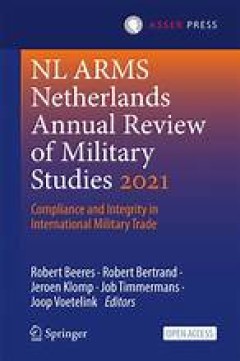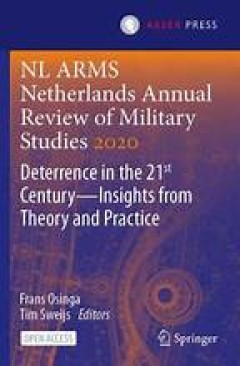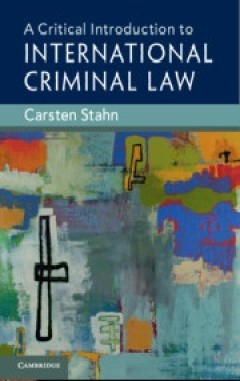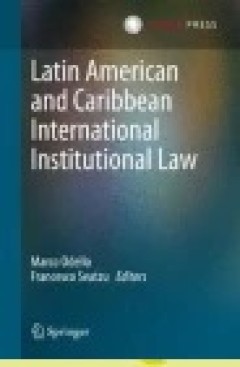Filter by

The South China Sea: The Geo-political Epicenter of the Indo-Pacific?
This open access book focuses on the geopolitical competition in the South China Sea, an area with highly concentrated choke points in the Indo-Pacific, presenting ideas and recommendations to manage this competition and foster cooperation to maintain a peaceful and stable environment and promote sustainable governance of the South China Sea and of the Indo-Pacific in a broader sense. The inc…
- Edition
- -
- ISBN/ISSN
- 9789819782093
- Collation
- XIV, 160 hlm ill; lamp
- Series Title
- -
- Call Number
- -

Climate Change and International Shipping
n Climate Change and International Shipping: The Regulatory Framework for the Reduction of Greenhouse Gas Emissions, Yubing Shi provides ground-breaking analyses of the evolving regulatory framework for the reduction of greenhouse gas emissions from international shipping.
- Edition
- 23
- ISBN/ISSN
- 9789004329317
- Collation
- -
- Series Title
- Legal Aspects of Sustainable Development, Volume: 23
- Call Number
- -

NL ARMS Netherlands Annual Review of Military Studies 2021
- Edition
- 1
- ISBN/ISSN
- 978-94-6265-471-6
- Collation
- -
- Series Title
- NL ARMS
- Call Number
- XI, 309
- Edition
- 1
- ISBN/ISSN
- 978-94-6265-471-6
- Collation
- -
- Series Title
- NL ARMS
- Call Number
- XI, 309

NL ARMS Netherlands Annual Review of Military Studies 2020
This open access volume surveys the state of the field to examine whether a fifth wave of deterrence theory is emerging. Bringing together insights from world-leading experts from three continents, the volume identifies the most pressing strategic challenges, frames theoretical concepts, and describes new strategies.
- Edition
- 1
- ISBN/ISSN
- 978-94-6265-419-8
- Collation
- -
- Series Title
- NL ARMS
- Call Number
- XXV, 530

International Actors and the Formation of Laws
This open access book addresses the discourse that creates, modifies, and reshapes the law, as well as discourse participants. The book focuses on the actors operating in legal regimes and their subtly, bluntly, or even outright aggressive impact on the formation of laws. As the book examines the intersection of domestic, European, international, and even transnational, legal regimes where new …
- Edition
- 1
- ISBN/ISSN
- 978-3-030-98351-2
- Collation
- -
- Series Title
- -
- Call Number
- XVIII, 197

Beyond Data
This open access book focuses on the impact of Artificial Intelligence (AI) on individuals and society from a legal perspective, providing a comprehensive risk-based methodological framework to address it. Building on the limitations of data protection in dealing with the challenges of AI, the author proposes an integrated approach to risk assessment that focuses on human rights and encompasses…
- Edition
- 1
- ISBN/ISSN
- 978-94-6265-531-7
- Collation
- -
- Series Title
- Information Technology and Law Series
- Call Number
- XXIII, 200

Asian Yearbook of International Law, Volume 21 (2015)
The Yearbook aims to promote research, studies and writings in the field of international law in Asia, as well as to provide an intellectual platform for the discussion and dissemination of Asian views and practices on contemporary international legal issues. Readership: All interested in International Law and Asian Law.
- Edition
- -
- ISBN/ISSN
- -
- Collation
- -
- Series Title
- -
- Call Number
- -

A Critical Introduction to International Criminal Law
International criminal law has witnessed a rapid rise after the end of the Cold War. The United Nations refers to the birth of a new 'age of accountability', but certain historical objections, such as selectivity or victor's justice, have never fully gone away, and many of the justice dimensions of international criminal law remain unexplored. Various critiques have emerged in socio-legal schol…
- Edition
- -
- ISBN/ISSN
- 9781108399906
- Collation
- -
- Series Title
- -
- Call Number
- -

A Farewell to Fragmentation Reassertion and Convergence in International Law
Fragmentation has been much discussed as a threat to international law as a legal system. This book contends that the fragmentation of international law is far exceeded by its convergence, as international bodies find ways to account for each other and the interactions of emerging sub-fields. Reasserting its role as the 'principal judicial organ of the United Nations', the International Court o…
- Edition
- -
- ISBN/ISSN
- 9781139979498
- Collation
- -
- Series Title
- Studies on International Courts and Tribunals
- Call Number
- -

Latin American and Caribbean International Institutional Law
This book is one of the few comprehensive works focusing on the sub-regional institutions in the Latin American and Caribbean region. These organisations and institutions enrich the co-operation at sub-regional level, but, in most cases, are neglected in legal literature. They have mainly economic purposes but they also contribute to new forms of institutional co-operation in other areas, inclu…
- Edition
- -
- ISBN/ISSN
- 978-94-6265-068-8
- Collation
- -
- Series Title
- -
- Call Number
- -
 Computer Science, Information & General Works
Computer Science, Information & General Works  Philosophy & Psychology
Philosophy & Psychology  Religion
Religion  Social Sciences
Social Sciences  Language
Language  Pure Science
Pure Science  Applied Sciences
Applied Sciences  Art & Recreation
Art & Recreation  Literature
Literature  History & Geography
History & Geography